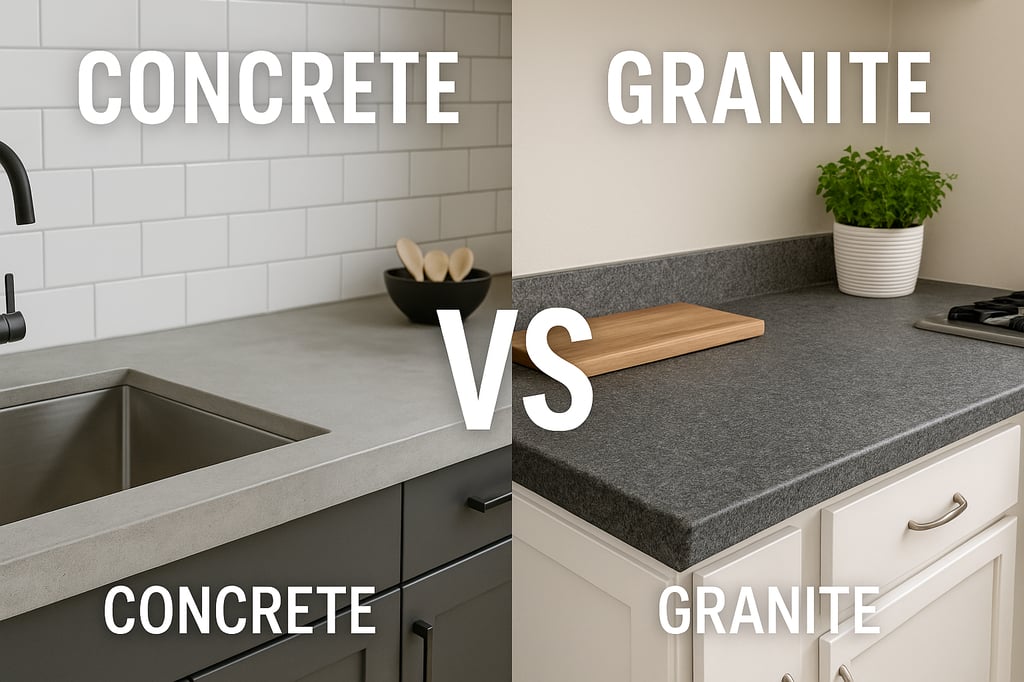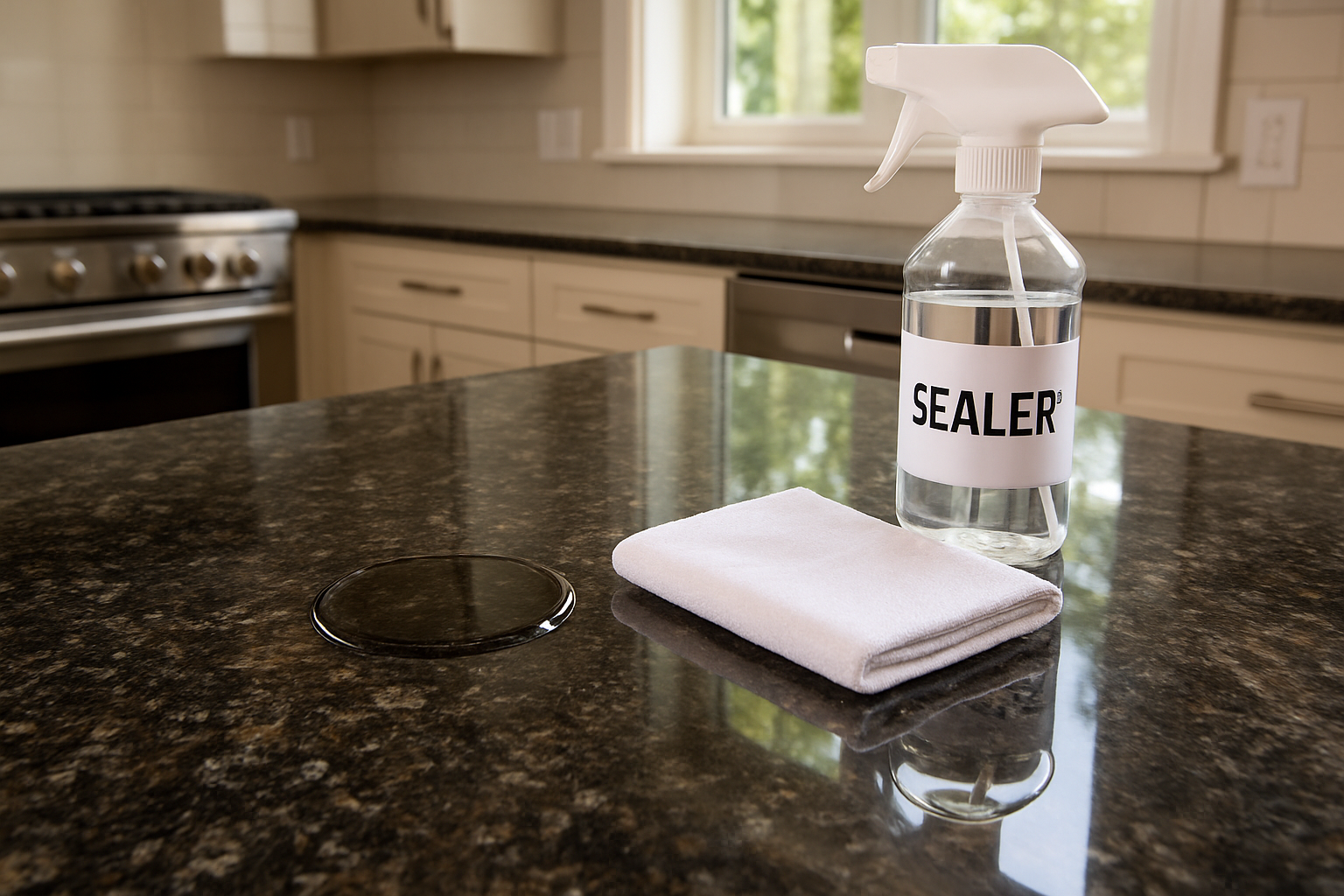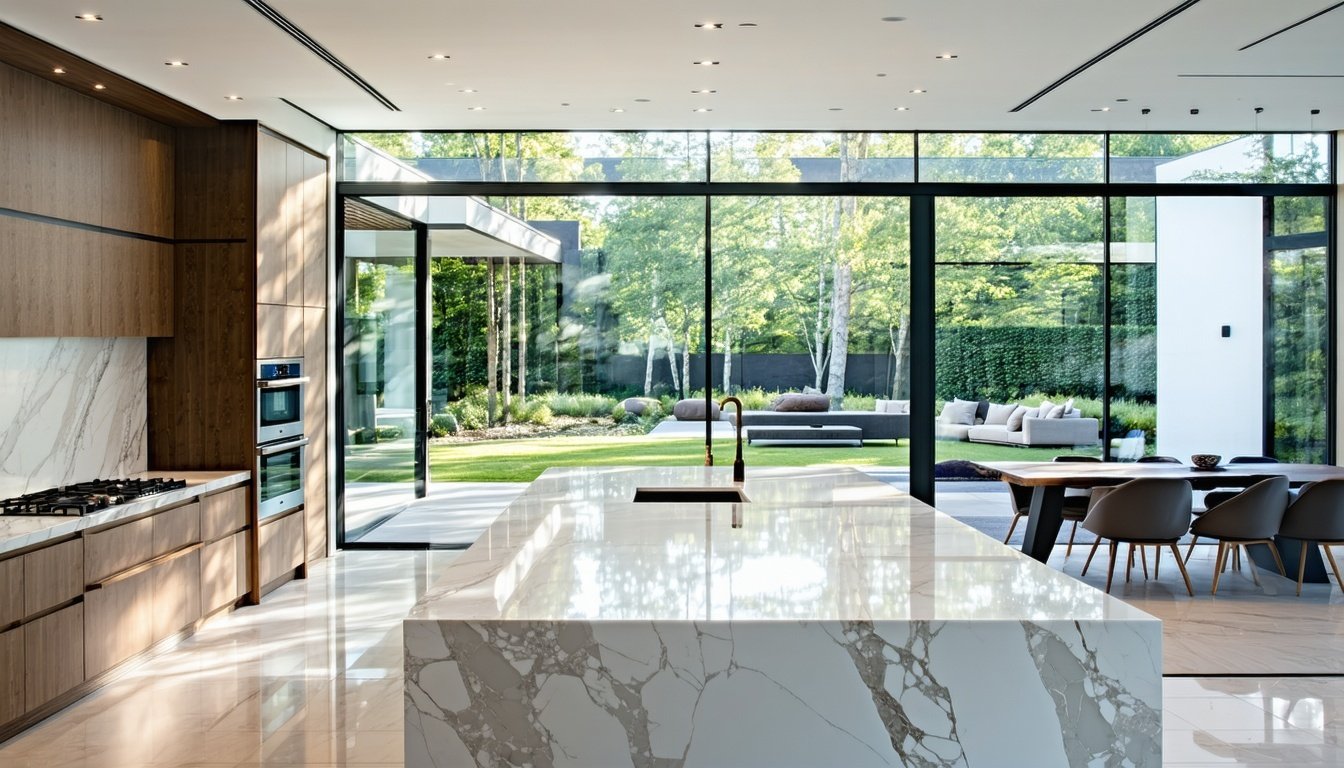Concrete vs. Granite: Which Countertop Offers Better Value?

Granite Guy Inc. | Serving Homeowners Across Massachusetts and New England
If you’re shopping for new kitchen countertops or bathroom surfaces, chances are you’ve come across two standout options: concrete countertops and granite countertops. These materials are both stylish and durable, and they’ve each earned a strong following among homeowners, designers, and builders alike.
But while they may seem similar at first glance, they’re very different in how they look, perform, and hold up over time. This guide breaks down everything you need to know to make the right call for your space—whether you’re after a fully custom look or something more timeless and classic.
What to Know About These Two Countertop Materials
Choosing the right countertop material is one of the most important decisions you’ll make when remodeling a kitchen or bathroom. It affects not only the design, but how much maintenance you’ll need, how long it’ll last, and how much it costs.
-
Concrete countertops are made from a blend of cement, water, and aggregates like sand or crushed stone. The result is a highly versatile surface that can be molded into any shape or size you need.
-
Granite countertops are cut from natural stone slabs that are quarried from the earth’s surface. They’re prized for their organic patterns, durable material makeup, and stain-resistant properties.
Both materials are strong contenders, but the right choice depends on your style, priorities, and how much ongoing effort you're willing to commit to.
Granite Countertops: Natural Beauty That Lasts
Granite is a natural stone formed when magma cools and solidifies beneath the earth’s surface. It’s made of quartz, feldspar, and other minerals, and it’s quarried all over the world—most commonly in Brazil, India, and Italy.
Each granite slab is unique. The patterns and different minerals create swirls, flecks, and dramatic veining that you just won’t find in man-made products. It comes in dozens of color options and finishes, including:
-
Polished (high-gloss, reflective)
-
Honed (matte, soft feel)
-
Leathered (textured, natural grip)
Granite is heat resistant, scratch resistant, and naturally stain resistant when properly sealed. It’s a top choice for kitchen countertops, bathroom vanities, fireplace surrounds, and outdoor kitchens.
If you're looking for a tough material that doesn’t need much ongoing effort, granite countertops are a smart long-term investment.
Concrete Countertops: Customizable and Contemporary
Concrete surfaces are made by mixing cement, water, and crushed stone or sand, then pouring that mix into molds. Once cured and polished, the result is a smooth, solid surface that’s completely tailored to your space.
What makes concrete stand out is its design flexibility. You can:
-
Choose nearly any color or texture
-
Mold it into unique shapes
-
Embed decorative items like glass, shells, or metal
-
Mimic the appearance of natural materials like marble or stone
You’ll also find hybrid products like granite concrete, which gives you the visual appeal of granite with the molding flexibility of concrete.
But keep in mind: concrete is a porous material, so it needs a sealed surface to prevent stains. You’ll also need to reapply that sealer every 1–3 years, and possibly wax the surface monthly. It’s a bit more maintenance than granite, but if you're going for a one-of-a-kind look, the trade-off can be worth it.
Durability and Maintenance: Concrete vs. Granite
Let’s talk day-to-day use. Both materials are durable, but they behave differently.
-
Concrete countertops are strong and can be heat resistant and scratch resistant when properly sealed. But because it’s a porous material, you’ll need to stay on top of sealing and avoid placing hot pots directly on the surface.
-
Granite countertops are also heat resistant, and the natural stone is less likely to stain easily. With a once-a-year sealing, granite requires less maintenance overall than concrete.
If you’re someone who doesn’t want to deal with as much ongoing effort, granite’s going to be the easier route. But if you love a smooth surface with a modern or industrial edge, concrete might still be worth it—just know it takes a little more work to maintain.
Cost Breakdown: Concrete vs. Granite
Price matters—and here’s how the two stack up per square foot.
-
Basic granite usually starts around $35/sq. ft. and goes up to $100 or more depending on the color and country of origin. Rare patterns or stones imported from far away will naturally cost more.
-
Concrete countertops range from $65 to $135/sq. ft., thanks to higher labor costs. Since each concrete top is custom poured and finished by hand, you’re paying for that craftsmanship.
There’s a big difference in the manufacturing process, too. Granite is cut directly from a slab of natural stone, while concrete is built from scratch with molds. That means concrete can be more personalized, but you’re also paying for that flexibility.
Appearance and Design Options
Granite offers a naturally stunning appearance that doesn’t require much effort. Each slab has unique colors, veining, and movement, and the stone’s polished finish reflects light in a way that adds luxury to any room.
Concrete countertops, on the other hand, offer endless design options. You can add pigment, embed items, or even use stencils to give it a patterned or textured finish. Want a beachy vibe? Add crushed shells. Want something modern and minimal? Go matte gray. You can make it look like concrete or like natural materials.
Just keep in mind: concrete can develop a patina over time. Some homeowners love the way it “ages,” while others prefer a consistent look. That’s something to factor in before committing.
Outdoor Use & Environmental Impact
For outdoor kitchens or entertainment areas, both materials hold up—but with caveats.
-
Granite countertops are weather-resistant, but in climates like New England, the freeze-thaw cycle can lead to cracking if they’re not sealed properly.
-
Concrete countertops can be made to withstand outdoor elements and temperature swings, but they still need sealing to keep moisture out.
From a green perspective:
-
Concrete can have a large carbon footprint, but using fly ash or other recycled materials can make it more eco-friendly.
-
Granite, while a natural material, is often imported—so transportation adds to its environmental impact.
Final Thoughts: Which Countertop Material Is Best?
Choosing between concrete countertops and granite countertops comes down to your priorities.
Go with granite if you want:
-
A natural stone with timeless beauty
-
A stain resistant, heat resistant, and low-maintenance surface
-
A material that’s easy to maintain with minimal ongoing effort
Choose concrete if you want:
-
Total control over design options, shape, and color
-
A durable material with a modern or custom vibe
-
A unique piece that reflects your personal style—even if it means a little more maintenance
Visit Granite Guy Inc. in Southborough, MA
Still deciding? Come check out our selection of natural stone and engineered countertops in person. At Granite Guy Inc., we’ve helped thousands of homeowners across Massachusetts and New England find the right material for their project—whether it’s granite, quartz, or something totally custom.
📍 Visit us on Route 9 in Southborough, MA
📞 Call (508) 460-7900
🌐 graniteguyinc.com


